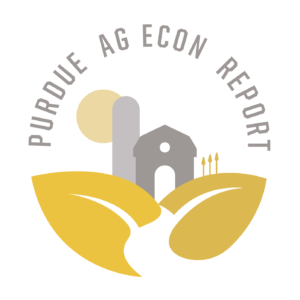U.S. Economy: More Improvement, Maybe
December 23, 2012
PAER-2012-11
Larry DeBoer, Professor
The outlook for the general economy remains uncertain. Things likely will be a little better next year, but threats remain.
Gross domestic product grew 2.5% above inflation in the year through the 3rd quarter of 2012. The unemployment rate fell from 8.7% in November 2011 to 7.7% in November 2012, a bigger-than-expected drop given the slow GDP growth. Inflation was low. The Consumer Price Index inflation rate was 2.1% in the year through November 2012. Interest rates were exceptionally low. The 10-year Treasury bond rate averaged 1.65% in November, and the 3-month rate was 0.09%–yes, that’s nine one-hundredths of a percent. Short-term interest rates have not been that low since the 1930’s.
The economy has grown slowly, partly because households aren’t spending. Consumer spending has grown only 1.8% above inflation in the past year. There is a glimmer of hope that households will spend more in 2013. Unemployment has fallen some. Debt payments have been worked back down to early 1990’s levels. Home prices have stopped falling. The University of Michigan’s Index of Consumer Sentiment is at its highest level since before the Great Recession.
The housing market has begun to recover. Home prices have begun rising again in some markets. Housing starts are up 42% in the past year, to an annual rate of just under 900,000 in November. Up is good, but there’s still a long way to go as starts averaged 1.6 million per year during the recession of 2001. Non-residential investment spending is not faring quite as well, up only 4.4% in the past year, and down 2.2% in the 3rd quarter.
Trade is making little contribution to economic growth one way or the other. Exports are growing slowly, just 3% over the past year, and so are imports, at 2.7%. Most of Europe is in recession, and growth in China may have tapered off, from amazingly fast to merely fast. The dollar remains strong against the euro, which keeps U.S. exports expensive. The dollar has fallen against the Chinese yuan in the past few months, however. The on-going financial crisis in Europe appears to have abated for the time being, but uncertainty remains.
Congress and the President are struggling with the “fiscal cliff.” Taxes will rise and spending will drop by about $500 billion beginning in January 2013, unless Congress acts. This represents more than 3% of our annual gross domestic product. Yank that much spending out of an economy growing at 2.5%, and the result is recession. Uncertainty about the outcome of these negotiations already may be suppressing business investment growth.
Of course, the benefit of jumping off the fiscal cliff is a smaller budget deficit. This is desirable once the economy has fully recovered. Deficits in a fully recovered economy can raise interest rates or raise inflation, crowd out private investment and ultimately slow real GDP growth. That’s not the problem now, though. Interest rates are at record lows and inflation is under control. Closing the deficit in our weak economy would lead to recession.
Assuming that the fiscal cliff is averted, we should see somewhat more confident consumers and businesses, and a continued recovery in housing would offset slow growth in government spending and slow growth in exports. This would allow GDP growth to continue at 2.5% above inflation in 2013. Such slow growth has usually not been enough to bring unemployment down. That would put the unemployment rate at about 7.8% by November 2013.
The Federal Reserve made an unusual pledge in recent months, to continue monetary expansion until the unemployment rate comes down. They pledged to hold the federal funds interest rate near zero through mid-2015 or until inflation rises above 2.5% or unemployment drops to 6.5%. We can count on interest rates remaining low. Expect the 3-month Treasury rate to be near zero, and the 10-year rate to remain under 2%, by this time next year.
Someday all that money could result in higher inflation, but probably not in 2013. Continued slack in the economy should hold inflation down, near 2.0% in the coming year.
